The Death of Democracy in Bangladesh
Democracy in Bangladesh hangs in the balance, and an upcoming election will mark a critical inflection point.
Then, on one memorable day in October, different public relations groups deluged the inboxes of Bangladesh watchers with competing messages on the same afternoon. First, an outfit representing Dhaka sent out a triumphant message during the lunch hour about government achievements. Then, several hours later, a group apparently assisting the Bangladesh Nationalist Party dropped a depressing note about how “democracy is darkening” in Bangladesh. Washington appears to have become a ground zero for the ugly battle of narratives being waged between Dhaka and the opposition.
Given all that the Trump administration has on its plate, U.S. officials likely won’t take much interest in Dhaka’s tumult. But the stakes are high. Bangladesh’s political volatility is rooted in part in anti-state grievances that are ripe for exploitation by violent extremists. Terrorist violence, much of it waged by Bangladeshi militant groups and sometimes with support from local factions of ISIS, has receded over the last two years following heavy state crackdowns. Still, Dhaka’s continued draconian measures against the opposition risk precipitating a new wave of radicalization. So does the election, if it is unfree and unfair, thereby intensifying the opposition’s grievances toward the government. This is an opposition, after all, that includes factions that already use violence and harbor links to terror groups.
This should all be unsettling for the United States, which has long considered stability to be its paramount interest in South Asia.
For Washington, prodding Bangladesh to take useful steps—such as forming an inclusive administration of both the ruling party and opposition parties to oversee preparations for the election, and dissolving Parliament before the election—would admittedly have little effect. Given recent tensions between the U.S. embassy in Dhaka and the government in Bangladesh, such prodding would likely be unsuccessful, not to mention counterproductive. More broadly, given the hyperpolarization in Bangladeshi politics, expecting the government to initiate such moves, no matter who urges them, may amount to a fool’s errand.
A Critical Inflection Point
Today, democracy in Bangladesh hangs in the balance, and the upcoming election—now scheduled for December 30—will mark a critical inflection point.
Several weeks ago, one of us (Michael Kugelman), met with a visiting group of youth activists from the Awami League and the Bangladesh Nationalist Party. While the group predictably disagreed on many things, they were remarkably in lockstep on one basic point: a free and fair election would put the country on a better path. This emphasis on the importance of a successful poll dovetails with public opinion surveys in Bangladesh over the past few months. These surveys find that while there is increasing unhappiness about their government’s efforts to uphold democracy, large majorities still intend to vote in the election.
Public opinion polls also find that large numbers of Bangladeshis want more cooperation between political parties. The recent formation of a new political alliance, the Jatiya Oikyafront, led by prominent citizens and comprised of former officials from both the Bangladesh Nationalist Party and Awami League, offers a glimmer of hope for a third way that goes beyond the longstanding dominance of two bickering major parties. However, while the Awami League has twice engaged the Jatiya Oikyafront in discussions about the upcoming elections, no compromises have yet been reached between the two parties.
There may be a hunger among some in Bangladesh for a credible election and a more conciliatory era of politics. Unfortunately, reading the country’s political tea leaves, such outcomes have never appeared more elusive.
Atif Ahmad, born and raised in Bangladesh, is a Washington, D.C.-based researcher and a student at the School of Advanced International Studies (SAIS).
Michael Kugelman is senior associate for South Asia and deputy director of the Asia Program at the Woodrow Wilson Center.
Image: Reuters

